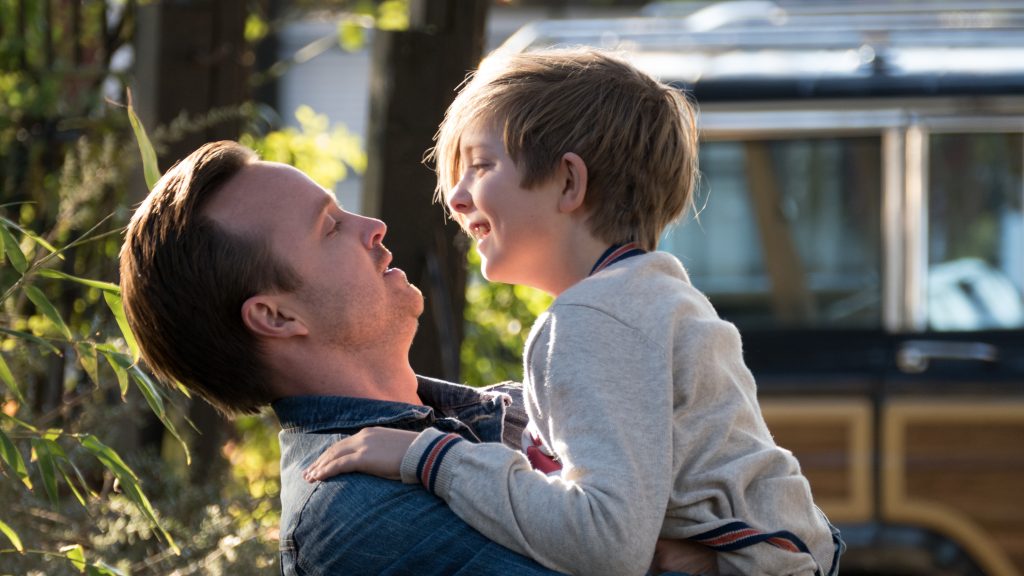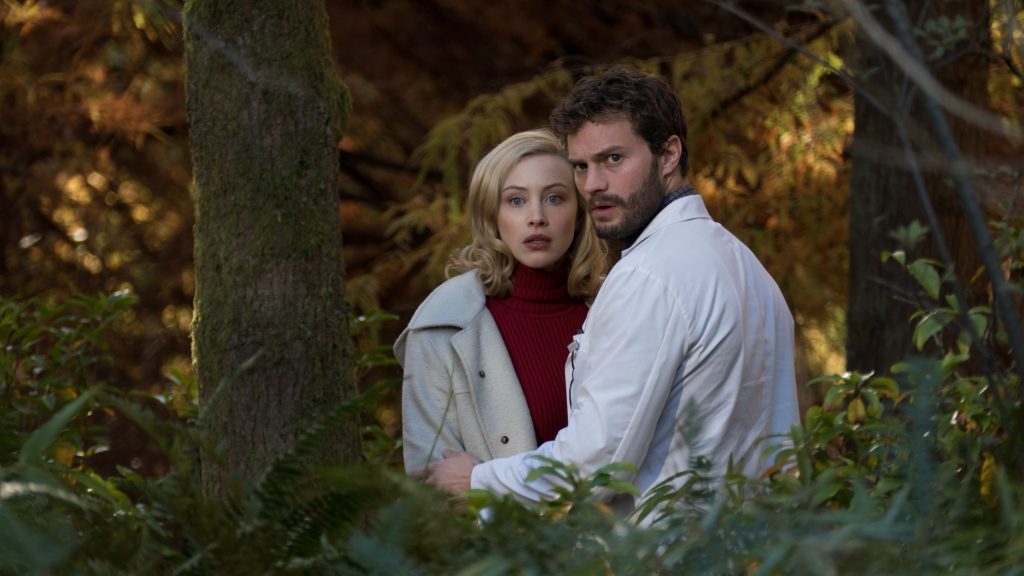
Photo courtesy: Miramax
The 9th Life of Louis Drax is a psychological drama that explores the deepest, darkest secrets of the human mind. Set in San Francisco, this film pays homage to Alfred Hitchcock in more ways than one, but screenwriter Max Minghella admits it’s the “Hitchcock blonde” who holds all the power in this twisted tale about the dark side of beauty.
Based on the book by Liz Jensen, the film tells the story of Dr. Pascal (Jamie Dornan), a psychologist who begins working with Louis Drax (Aiden Longworth), a young boy who has suffered a near-fatal fall and lingers in coma. But the deeper Dr. Pascal digs into the mysterious circumstances of the accident, the more he is drawn to Louis’s seductive mother, Natalie (Sarah Gadon).
In Hitchcock’s conversations with French filmmaker Francois Truffaut in 1962, Hitchcock said, “You know why I favor sophisticated blondes in my films? We’re after the drawing-room type, the real ladies, who become whores once they’re in the bedroom.” But Hitchcock was clear that a female character’s sexuality must be understated. “Sex should not be advertised. . .Because without the element of surprise the scenes become meaningless. There’s no possibility to discover sex.”
In the movie version of The 9th Life of Louis Drax, there’s more to discover about Natalie than just her sexuality and that’s how screenwriter Max Minghella designed it.
You may know Minghella as an actor in films like Horns, Into the Forest or The Social Network. But the son of the late Oscar-winning director, Anthony Minghella (The English Patient, The Talented Mr. Ripley), was so moved by Jensen’s novel, he began writing the screenplay as soon as he finished reading the book.
“By chapter three, I was already making notes on the adaptation. It immediately felt cinematic. I could also identify some very personal things I could bring to it – things I was very interested in talking about anyway,” Minghella said in an interview with ScreenwritingU.
Despite the dark undercurrents in the book, Minghella liked the playfulness of the story. “I felt that the logic of the world was so abstract that it could allow for quite a lot of freedom and experimentation,” he said.

Photo courtesy: Miramax
The process of developing the film took nearly seven years, and the screenplay evolved over that time. “There are a lot of very literary metaphors in the novel and immediately, you go, ‘Well I can’t do this in film. It has to change,’ and that was great.”
But adapting such cerebral, symbolic text into a visual narrative wasn’t always easy. “I struggled for a minute and then realized that I wanted to set the film in the heightened reality of movies. Not to the extreme of Pleasantville, but find its place in a cinematic universe, where the characters are all somewhat archetypal so then we can process these wild and abstract ideas more comfortably.”
He wanted viewers to feel safe knowing that this strange story isn’t happening in the real world. “It was important for [the audience] to be able to digest some of the crazy shit that happens.”
And trust me, there is some really crazy stuff in the movie including the appearance of monsters, both real and imagined. The most gruesome monster of all you may not even see coming.
“I’m a big whore for twists and turns. The fastest way to get me to see a movie is tell me there’s a twist in it. But beyond the twists already in the book, I could see the potential for adding a few more,” says Minghella.
Warning: spoilers ahead!
Though it’s Louis’s story, Minghella admits he loved writing the character Natalie most of all. “In my mind, every character in this movie has existed in another movie, none more so than Natalie Drax – she’s a Hitchcockian blonde in the most extreme sense. I probably would have taken that a beat further than Alex [director, Alexandre Aja] did, indicating her dangerousness.”
Minghella describes a debate that took place early on in the film on whether or not to have Natalie walk into the hospital seductively, with her hips swinging in slow motion.
“I was really fascinated by the power of beauty and how hard it is for us to believe that beautiful people are capable of terrible things. Louis even says something very on-the-nose at the end, ‘Pascal thought because [Natalie] was beautiful, so she must be good. But she’s not good.’ That became a very strong theme to me in the movie – how beauty can blind us. I’m certainly very guilty of that in my own life.”
I asked Minghella how his father has influenced him as a storyteller. He said that for a long time, he was too focused on structuring the movie to think about what he learned from his father Anthony, who passed in 2008, when Max was just 23.
“It took me years to just tackle the narrative construct of the screenplay. Once I got through that part of it, I decided to focus the emotional through-line of the story on a boy who lost his father. The last scene of the movie – the emotional twist of the movie – is something that is very personal.”
Bingo.
But he did include some very clear tributes to his father throughout the movie. “The character Julian [Wadham] plays in the film, Dr. Janek, is actually a direct homage to the role that Julian played in The English Patient. They are the same character even though they have different names. That was really fun for me because I love this idea of doing a really bizarre crossover. The hospital is also named St. Anthony’s. My father also worked on a TV series called The Storyteller when I was a child and I would say the influence of The Storyteller is blatant throughout.”
Minghella’s advice for tackling difficult material is for writers to just take their own sweet time. “I wrote the first draft of the film in 2008, we shot it in 2014, and I was working on the script throughout that whole time. Writing does not come naturally to me at all, I’m very, very slow. I don’t think the script would have been readable at any point had I not had the time to just try and try again – and fail in private. I would say the first 12 drafts of Louis Drax were embarrassing. You just have to stick at it,” he said.
The 9th Life of Louis Drax opens in theaters Septemeber 2.




1 Reply to "Max Minghella talks the power of the Hitchcockian blonde as well as his father, Anthony Minghella’s, influence"
Craig September 6, 2016 (10:16 am)
I enjoyed this article so much due to good writing and good interview questions, all of which got right to the heart of some great screenplay issues. It was also encouraging to hear Max talk about his writing pace and process. I’m not the fastest wordslinger on the planet either!